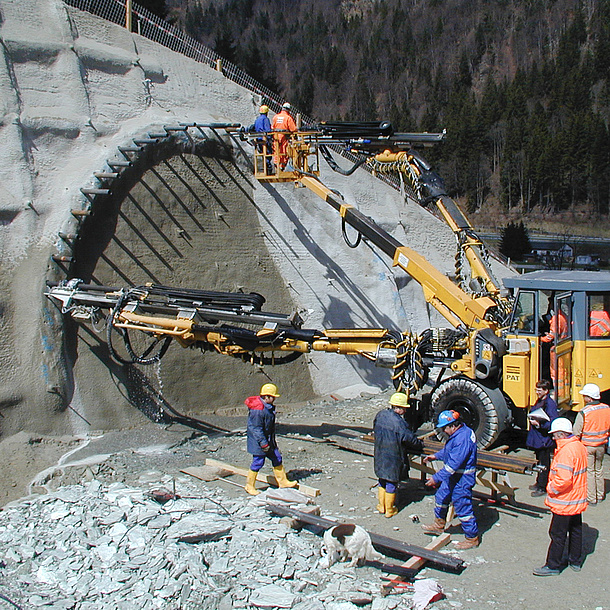Quick Facts
- Duration of study: 4 Semester
- ECTS credit points: 120
- Academic degree:
Diplom-Ingenieurin
orDiplom-Ingenieur
(Dipl.Ing. or DI), equivalent to the Master of Science (MSc) - Language of instruction: English
The Master's Programme
In the master's degree programme Geotechnical and Hydraulic Engineering
, you will broaden and deepen the knowledge you obtained in your bachelor's degree programme, such as those in Civil Engineering Sciences and Construction Management, Environmental Engineering, Engineering Geology and Mechanical Engineering and Business Economics.
You will acquire sound knowledge in specialist fields such as geology, soil mechanics, foundation engineering, numerical calculation methods, rock mechanics, tunnel construction, hydraulics, constructive hydraulic engineering and water management. We devote special attention to addressing challenges we will face in the future, such as natural hazards, sustainability issues and adapting to climate change.
A special focus is placed on the use of state-of-the-art research equipment and extensive laboratory facilities for hydraulic engineering, rock mechanics, soil mechanics and applied geosciences. In the water laboratory, you will carry out experiments for the efficient use of hydropower, flood protection and ecological river modelling. In the rock mechanics laboratory, you will learn how to use special experimental equipment to conduct research on so-called transition and weathered rocks, as well as address the challenge faced in the mountains under permafrost conditions. In addition to the experimental equipment that is available in the soil mechanics laboratory to determine mechanical, hydraulic and dynamic soil properties, a large-scale, in-situ test facility is currently being constructed. In the geoscientific laboratories, you can learn how to use extensive (isotopic) chemical, mineralogical and experimental techniques to characterise water and rock, such as mineral synthesis or weathering techniques. It’s possible to use state-of-the-art radar sensor technology to conduct real-time monitoring and assess the condition of structures and subsoil with high accuracy.
Play video
Students talk about the Master's programmes in Civil Engineering

It is not only the specialist knowledge that you acquire but also the personal contact to teachers that makes this degree stand out. Students are taught in small groups by internationally recognised experts, who ensure that the information is understood. The applicability of the information taught makes it possible for students to start a successful career directly after graduating.
Focus Areas
You learn how to assess the material behaviour of geomaterials and to quantify soil, rock and hydraulic properties. You learn about disaster management, the assessment of natural hazards and designing protective construction. You design, measure, monitor and construct foundations, supporting structures, natural and artificial slopes and embankments, tunnels and underground structures, as well as dams and hydroelectric power plants.
In the programme, you will deepen your knowledge in one of the following focus areas:
Hydraulic Engineering and Water Resources Management: You will delve into hydraulic engineering and water resources management and learn more about hydrologic-hydraulic processes and numerical calculation methods. You will concentrate on the planning, construction, monitoring and maintenance of hydraulic structures and learn methods used for risk analysis, and especially for floods.
Soil Mechanics, Foundation Engineering and Computational Geotechnics: Among other things, you will gain an understanding of the properties of soil as a foundation and a building material, placing a special focus on the interaction between the structure and subsoil. Focus areas include numerical geotechnics, questions of sustainability and of the assessment of the condition of geotechnical constructions, as well as the assessment and rehabilitation of mass (land) movements.
Rock Mechanics and Tunnelling: A central focus is placed on the assessment of the behaviour of rocks and systems under different geological and geotechnical boundary conditions. On the basis of observations made, you learn how to identify characteristic behaviour. Subsequently, you learn how to use theoretical models to describe this behaviour as realistically as possible. The review of the models used in practice is a mandatory step in this planning process.
Collaborations and Networks
Cooperation with diverse universities, international organisations (ICOLD, ISRM, ISSMFE, ISAHR, ITA, etc.), corporate partners from Germany and abroad ensure that students work and learn while taking part in educational exchanges and research projects, as well as being involved with plants that are currently being planned and built. In addition, more in-depth courses are held by lecturers from the practice.
The excellent networking opportunities that exist with cooperation partners enables us to offer individually supervised master's theses and internships in many of our departments.

Studying Geotechnical and Hydraulic Engineering suits my deep interest in designing dams and tunnels. During my studies, I get the opportunity to explore and learn aspects of the design, construction, monitoring and maintenance of hydraulic structures, taking into account associated risk and force majeure.
Admission
The prerequisite for admission is a completed bachelor’s degree in a relevant subject (see curriculum).
Additionally, you need to provide evidence of competence in the English language.
1. Admission Procedure
Admission without admission procedure
Graduates of the following bachelor’s programmes at TU Graz are eligible for the master’s programme without an admissions procedure:
Graduates of all other degree programmes offered at the TU Graz can apply for admission at the Registrar's Office without an admission procedure.
Admission with admission procedure
Graduates of a previous study programme not mentioned above undergo an admission procedure.
Registration for the academic year 2026/27: 15 October to 15 December 2025
You can complete the admission procedure before the end of your bachelor’s studies.
Please do not send any documents by post!
2. Admission
- Admission and deadlines for international students
- Admission and deadlines for Austrian students who are registering to study at TU Graz for the first time
If you have already been admitted to a degree programme at TU Graz, or have studied at TU Graz before, please come to the Registrar's Office in person to complete your admission during the admission period.
Fragen zur Zulassung?
Contact study@tugraz.at
Career Prospects
Professional Fields
The programme provides you with the basis for a successful (international) career. The extensive range of courses to choose from enables you to receive individual training and takes into account the constantly changing requirements of the job market.
Geotechnical and hydraulic engineers are in great demand on the job market and work both nationally and internationally:
- in engineering offices,
- in construction companies and special civil engineering companies,
- with investment and insurance companies,
- in civil service and
- for public and private infrastructure managers.



